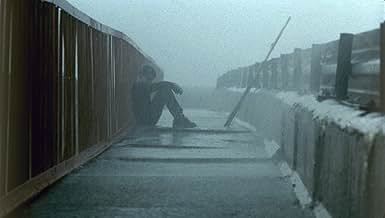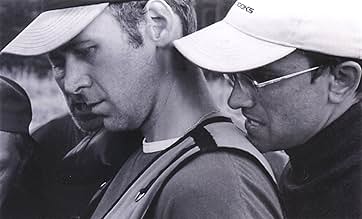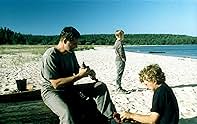AVALIAÇÃO DA IMDb
7,9/10
48 mil
SUA AVALIAÇÃO
Em um território selvagem da Rússia, dois irmãos enfrentam uma série de emoções novas e conflitantes quando seu pai - um homem que eles conhecem apenas através de uma única fotografia - reap... Ler tudoEm um território selvagem da Rússia, dois irmãos enfrentam uma série de emoções novas e conflitantes quando seu pai - um homem que eles conhecem apenas através de uma única fotografia - reaparece.Em um território selvagem da Rússia, dois irmãos enfrentam uma série de emoções novas e conflitantes quando seu pai - um homem que eles conhecem apenas através de uma única fotografia - reaparece.
- Prêmios
- 33 vitórias e 20 indicações no total
- Direção
- Roteiristas
- Elenco e equipe completos
- Produção, bilheteria e muito mais no IMDbPro
Enredo
Você sabia?
- CuriosidadesWhen pre-production was starting, director Andrey Zvyagintsev told producer Dmitry Lesnevsky there was no point in making the film if they couldn't find two boys who were "actors of genius." Zvyagintsev had two assistants who helped him look for actors, one in St. Petersburg and one in Moscow, and visited both cities himself. He found Vladimir Garin in St. Petersburg and Ivan Dobronravov in Moscow, picking them from over 600 contenders.
- Erros de gravaçãoWhen Ivan is sitting in the car, the camera pans around the car (before we see him grab the binoculars and begin to use them) - as it pans past the triangular car window you can see the camera reflected in it.
- ConexõesFeatured in Namedni 1961-2003: Nasha Era: Namedni 2003 (2003)
- Trilhas sonorasRequiem in re minore K626
by Wolfgang Amadeus Mozart
Avaliação em destaque
What child doesn't long for the parent he's never had, even with mom and dad arguing in the next room? What boy hasn't endured a week that seemed to encompass a lifetime? We begin with the wrenching ordeal of 8-year-old Ivan, or Vanya (Ivan Dobronravov), who's watched by a gang of his mates while he freezes with fear at the top of a wooden tower over a chilly swimming hole and can't get down till his mom comes to fetch him. He has a fierce argument with the other boys and his older brother, Andrey (Vladimir Garin) that shows his strength of character. Vanya's intense will and need to prove his courage will dominate the story, which depicts what happens when the boys' dad (Konstantin Lavronenko) suddenly appears after an absence of 12 years and takes the two boys on a fishing trip. They run back to the house, they see their beautiful mom, and she says 'Be quiet, your father is sleeping.' That's how they learn he's reappeared. The shot of him looking like Mantegna's 'Dead Christ' as the boys peep into the bedroom where he lies sleeping exemplifies the film's austere beauty.
We tolerate the mysterious father - his cruelty never seems quite over the top - because there's a perverted tenderness in his hardness with Ivan and Andrey. He wants to make up for lost time: he wants to shape them in these few days; wants to help them become men. He's always a nurturer and teacher as well as a demanding brute. The mystery that surrounds the man evokes the gap between all children and adults. They boys aren't even sure he's their real father, but their mother says so. The bond between the two boys has become the more intense in the absence of a father and the scene in their bedroom the first night when they talk excitedly about the day ahead is as vivid, beautifully photographed, and superbly acted as all the rest. The expressiveness of the two boys' faces is beyond wonderful.
This stunning debut features exceptional performances by the talented young actors, brilliant storytelling in a fable-like tale that's as resonant as it is specific, and exquisite cinematography not quite like any one's ever seen before. There's something haunting about the sound track too - the way the clear voices emerge from silence and blend with music. There's nothing in "The Return" that isn't fresh and compelling. It's unlikely that there are any more intense evocations of boyhood or relations with a father on film.
The lovely, cool physicality of the movie's images reinforces the sharp contrast between the winsome, cheerful Andrey and the dour, intense Ivan. Andrey seems to bond right away with their dad but it's Vanya who makes the underlying rules of their week together. Ivan always wants something, if only a meal or to be fishing, at a different time from the other two. He's a kvetch. But beyond that, his passion and discontent are terrifying. That big almost ghoulish angry face atop the little body looks like a man's and haunts us when Andrey's bright eyes and smile have faded from memory. Despite his hardness, their nameless father seems almost unformed next to Vanya. It's a battle of wills. Vanya refuses to eat when they finally get to a restaurant and his father won't let him eat later. Vanya complains about leaving a fishing place to drive on and his father dumps him at a bridge for hours where he sits huddled in freezing rain. It's an ordeal, and getting stuck in the mud is another struggle and battle of wills in which the father of course wins and saves them. Yet there are moments of sheer joy when the boys click with their father and delight in the new places and scenes that they view through binoculars and photograph with a 35-mm. camera. The trip ends at a deserted island where their father has a secret mission and little Vanya's torment leads to a disturbing finale.
The Return heralds the appearance of a gifted new filmmaker, perhaps a great one. At times it evokes such recent lonely, austere masterpieces as Bruno Dumont's 'Vie de Jésus,' Van Sant's underrated 'Gerry,' and Jim Jarmusch's 'Dead Man.' But Zvyagintsev is Zvyagintsev and nobody else. There's an exciting new director on the world cinematic scene and we'd better learn how to get our tongues around this slippery Slavic name. ('The Return' won the grand prize -- the "Leone d'Oro" -- at the Venice Film Festival last year. It's not hard to see why.)
We tolerate the mysterious father - his cruelty never seems quite over the top - because there's a perverted tenderness in his hardness with Ivan and Andrey. He wants to make up for lost time: he wants to shape them in these few days; wants to help them become men. He's always a nurturer and teacher as well as a demanding brute. The mystery that surrounds the man evokes the gap between all children and adults. They boys aren't even sure he's their real father, but their mother says so. The bond between the two boys has become the more intense in the absence of a father and the scene in their bedroom the first night when they talk excitedly about the day ahead is as vivid, beautifully photographed, and superbly acted as all the rest. The expressiveness of the two boys' faces is beyond wonderful.
This stunning debut features exceptional performances by the talented young actors, brilliant storytelling in a fable-like tale that's as resonant as it is specific, and exquisite cinematography not quite like any one's ever seen before. There's something haunting about the sound track too - the way the clear voices emerge from silence and blend with music. There's nothing in "The Return" that isn't fresh and compelling. It's unlikely that there are any more intense evocations of boyhood or relations with a father on film.
The lovely, cool physicality of the movie's images reinforces the sharp contrast between the winsome, cheerful Andrey and the dour, intense Ivan. Andrey seems to bond right away with their dad but it's Vanya who makes the underlying rules of their week together. Ivan always wants something, if only a meal or to be fishing, at a different time from the other two. He's a kvetch. But beyond that, his passion and discontent are terrifying. That big almost ghoulish angry face atop the little body looks like a man's and haunts us when Andrey's bright eyes and smile have faded from memory. Despite his hardness, their nameless father seems almost unformed next to Vanya. It's a battle of wills. Vanya refuses to eat when they finally get to a restaurant and his father won't let him eat later. Vanya complains about leaving a fishing place to drive on and his father dumps him at a bridge for hours where he sits huddled in freezing rain. It's an ordeal, and getting stuck in the mud is another struggle and battle of wills in which the father of course wins and saves them. Yet there are moments of sheer joy when the boys click with their father and delight in the new places and scenes that they view through binoculars and photograph with a 35-mm. camera. The trip ends at a deserted island where their father has a secret mission and little Vanya's torment leads to a disturbing finale.
The Return heralds the appearance of a gifted new filmmaker, perhaps a great one. At times it evokes such recent lonely, austere masterpieces as Bruno Dumont's 'Vie de Jésus,' Van Sant's underrated 'Gerry,' and Jim Jarmusch's 'Dead Man.' But Zvyagintsev is Zvyagintsev and nobody else. There's an exciting new director on the world cinematic scene and we'd better learn how to get our tongues around this slippery Slavic name. ('The Return' won the grand prize -- the "Leone d'Oro" -- at the Venice Film Festival last year. It's not hard to see why.)
- Chris Knipp
- 11 de abr. de 2004
- Link permanente
Principais escolhas
Faça login para avaliar e ver a lista de recomendações personalizadas
Detalhes
Bilheteria
- Faturamento bruto nos EUA e Canadá
- US$ 504.256
- Fim de semana de estreia nos EUA e Canadá
- US$ 19.795
- 8 de fev. de 2004
- Faturamento bruto mundial
- US$ 8.482.993
- Tempo de duração1 hora 50 minutos
- Cor
- Mixagem de som
- Proporção
- 1.85 : 1
Contribua para esta página
Sugerir uma alteração ou adicionar conteúdo ausente












